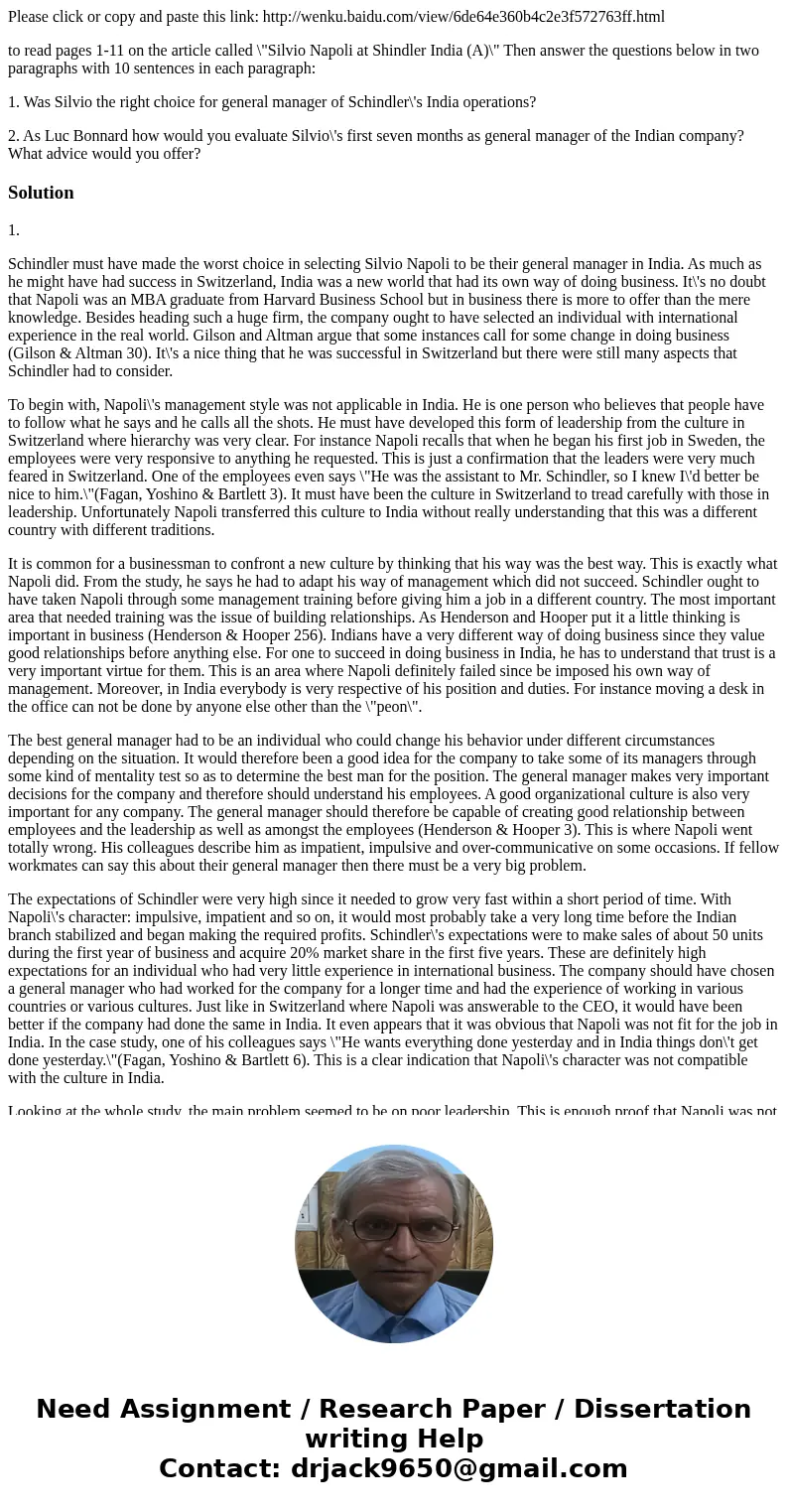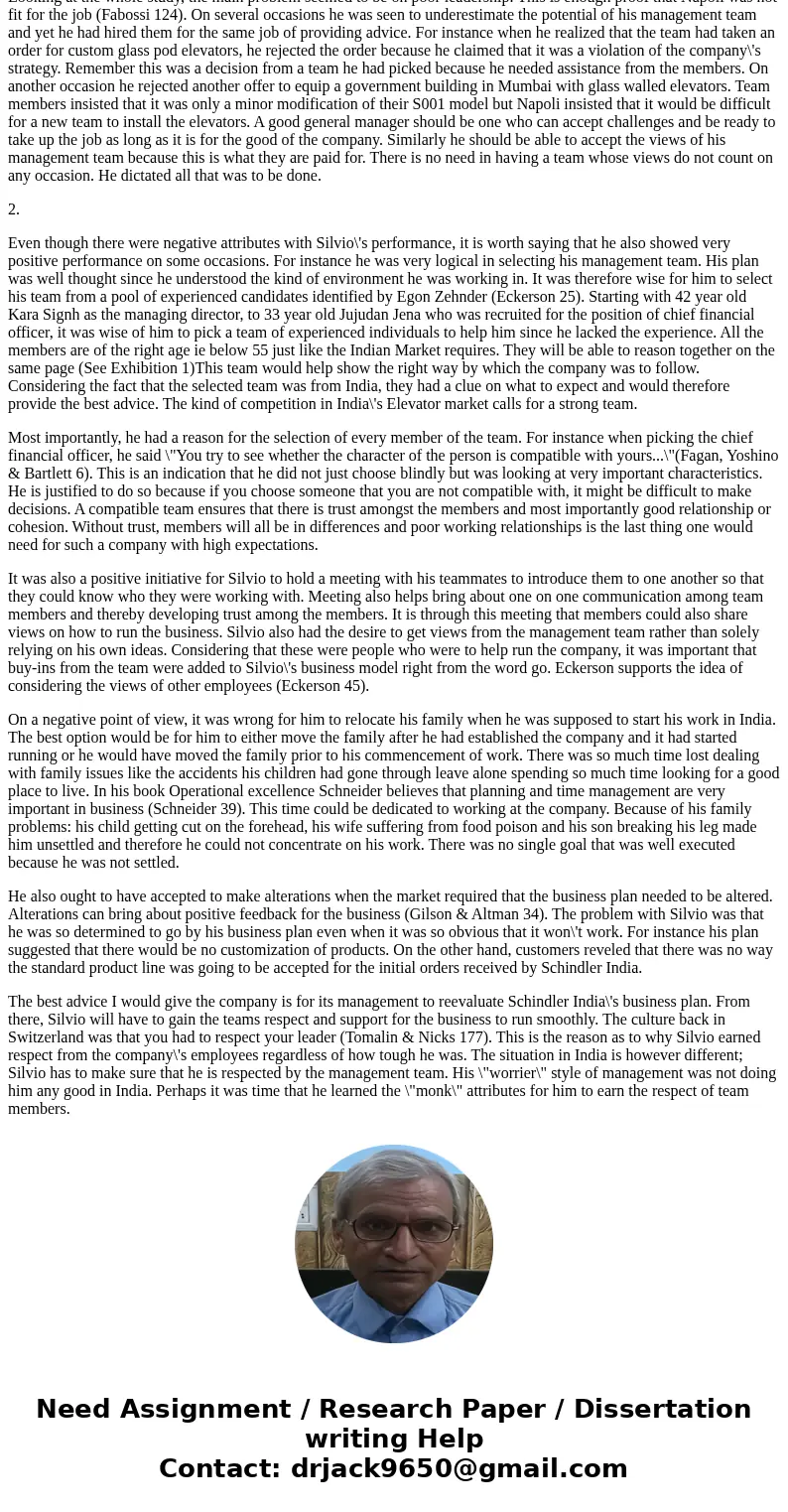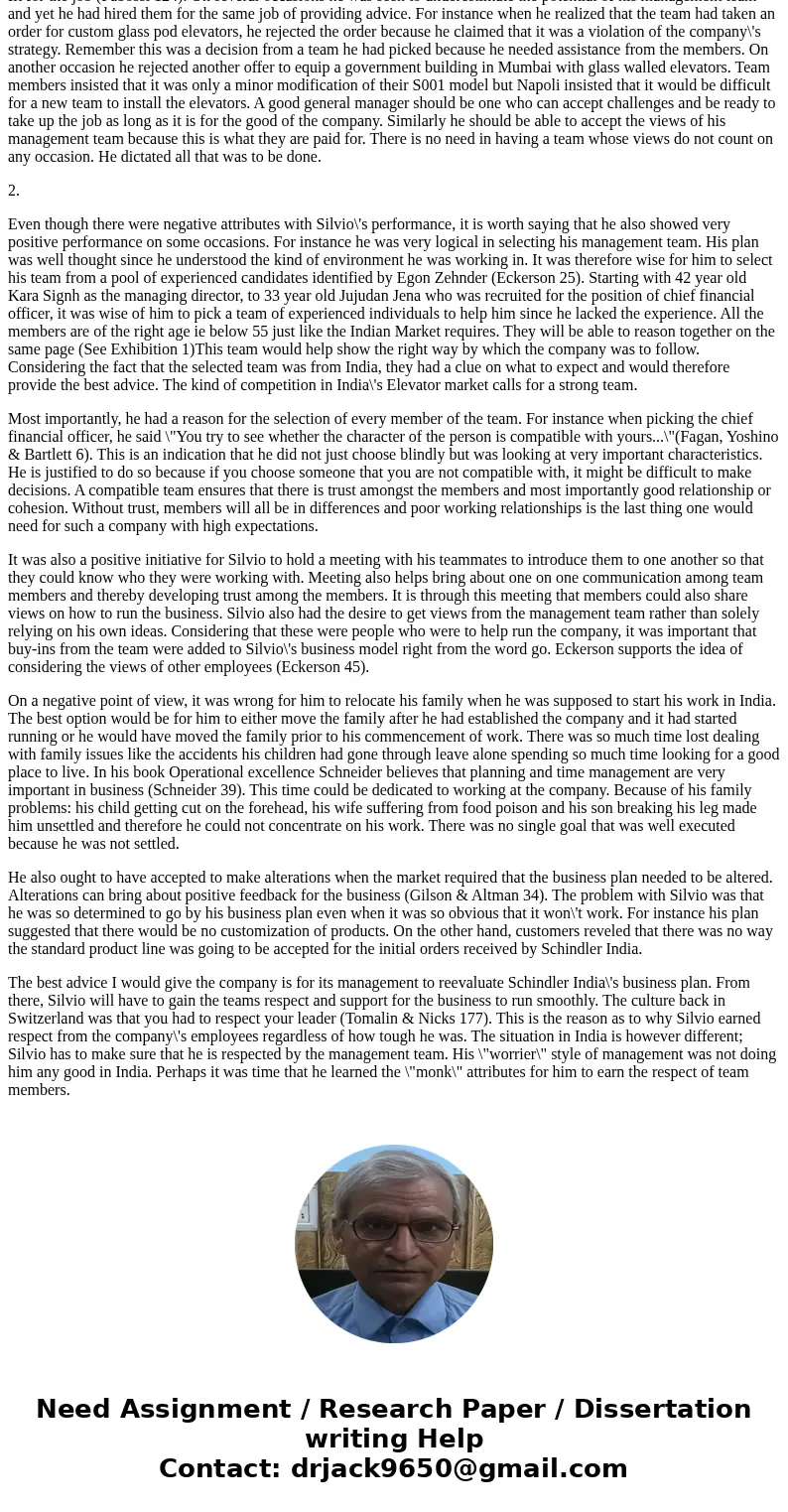Please click or copy and paste this link httpwenkubaiducomvi
Please click or copy and paste this link: http://wenku.baidu.com/view/6de64e360b4c2e3f572763ff.html
to read pages 1-11 on the article called \"Silvio Napoli at Shindler India (A)\" Then answer the questions below in two paragraphs with 10 sentences in each paragraph:
1. Was Silvio the right choice for general manager of Schindler\'s India operations?
2. As Luc Bonnard how would you evaluate Silvio\'s first seven months as general manager of the Indian company? What advice would you offer?
Solution
1.
Schindler must have made the worst choice in selecting Silvio Napoli to be their general manager in India. As much as he might have had success in Switzerland, India was a new world that had its own way of doing business. It\'s no doubt that Napoli was an MBA graduate from Harvard Business School but in business there is more to offer than the mere knowledge. Besides heading such a huge firm, the company ought to have selected an individual with international experience in the real world. Gilson and Altman argue that some instances call for some change in doing business (Gilson & Altman 30). It\'s a nice thing that he was successful in Switzerland but there were still many aspects that Schindler had to consider.
To begin with, Napoli\'s management style was not applicable in India. He is one person who believes that people have to follow what he says and he calls all the shots. He must have developed this form of leadership from the culture in Switzerland where hierarchy was very clear. For instance Napoli recalls that when he began his first job in Sweden, the employees were very responsive to anything he requested. This is just a confirmation that the leaders were very much feared in Switzerland. One of the employees even says \"He was the assistant to Mr. Schindler, so I knew I\'d better be nice to him.\"(Fagan, Yoshino & Bartlett 3). It must have been the culture in Switzerland to tread carefully with those in leadership. Unfortunately Napoli transferred this culture to India without really understanding that this was a different country with different traditions.
It is common for a businessman to confront a new culture by thinking that his way was the best way. This is exactly what Napoli did. From the study, he says he had to adapt his way of management which did not succeed. Schindler ought to have taken Napoli through some management training before giving him a job in a different country. The most important area that needed training was the issue of building relationships. As Henderson and Hooper put it a little thinking is important in business (Henderson & Hooper 256). Indians have a very different way of doing business since they value good relationships before anything else. For one to succeed in doing business in India, he has to understand that trust is a very important virtue for them. This is an area where Napoli definitely failed since be imposed his own way of management. Moreover, in India everybody is very respective of his position and duties. For instance moving a desk in the office can not be done by anyone else other than the \"peon\".
The best general manager had to be an individual who could change his behavior under different circumstances depending on the situation. It would therefore been a good idea for the company to take some of its managers through some kind of mentality test so as to determine the best man for the position. The general manager makes very important decisions for the company and therefore should understand his employees. A good organizational culture is also very important for any company. The general manager should therefore be capable of creating good relationship between employees and the leadership as well as amongst the employees (Henderson & Hooper 3). This is where Napoli went totally wrong. His colleagues describe him as impatient, impulsive and over-communicative on some occasions. If fellow workmates can say this about their general manager then there must be a very big problem.
The expectations of Schindler were very high since it needed to grow very fast within a short period of time. With Napoli\'s character: impulsive, impatient and so on, it would most probably take a very long time before the Indian branch stabilized and began making the required profits. Schindler\'s expectations were to make sales of about 50 units during the first year of business and acquire 20% market share in the first five years. These are definitely high expectations for an individual who had very little experience in international business. The company should have chosen a general manager who had worked for the company for a longer time and had the experience of working in various countries or various cultures. Just like in Switzerland where Napoli was answerable to the CEO, it would have been better if the company had done the same in India. It even appears that it was obvious that Napoli was not fit for the job in India. In the case study, one of his colleagues says \"He wants everything done yesterday and in India things don\'t get done yesterday.\"(Fagan, Yoshino & Bartlett 6). This is a clear indication that Napoli\'s character was not compatible with the culture in India.
Looking at the whole study, the main problem seemed to be on poor leadership. This is enough proof that Napoli was not fit for the job (Fabossi 124). On several occasions he was seen to underestimate the potential of his management team and yet he had hired them for the same job of providing advice. For instance when he realized that the team had taken an order for custom glass pod elevators, he rejected the order because he claimed that it was a violation of the company\'s strategy. Remember this was a decision from a team he had picked because he needed assistance from the members. On another occasion he rejected another offer to equip a government building in Mumbai with glass walled elevators. Team members insisted that it was only a minor modification of their S001 model but Napoli insisted that it would be difficult for a new team to install the elevators. A good general manager should be one who can accept challenges and be ready to take up the job as long as it is for the good of the company. Similarly he should be able to accept the views of his management team because this is what they are paid for. There is no need in having a team whose views do not count on any occasion. He dictated all that was to be done.
2.
Even though there were negative attributes with Silvio\'s performance, it is worth saying that he also showed very positive performance on some occasions. For instance he was very logical in selecting his management team. His plan was well thought since he understood the kind of environment he was working in. It was therefore wise for him to select his team from a pool of experienced candidates identified by Egon Zehnder (Eckerson 25). Starting with 42 year old Kara Signh as the managing director, to 33 year old Jujudan Jena who was recruited for the position of chief financial officer, it was wise of him to pick a team of experienced individuals to help him since he lacked the experience. All the members are of the right age ie below 55 just like the Indian Market requires. They will be able to reason together on the same page (See Exhibition 1)This team would help show the right way by which the company was to follow. Considering the fact that the selected team was from India, they had a clue on what to expect and would therefore provide the best advice. The kind of competition in India\'s Elevator market calls for a strong team.
Most importantly, he had a reason for the selection of every member of the team. For instance when picking the chief financial officer, he said \"You try to see whether the character of the person is compatible with yours...\"(Fagan, Yoshino & Bartlett 6). This is an indication that he did not just choose blindly but was looking at very important characteristics. He is justified to do so because if you choose someone that you are not compatible with, it might be difficult to make decisions. A compatible team ensures that there is trust amongst the members and most importantly good relationship or cohesion. Without trust, members will all be in differences and poor working relationships is the last thing one would need for such a company with high expectations.
It was also a positive initiative for Silvio to hold a meeting with his teammates to introduce them to one another so that they could know who they were working with. Meeting also helps bring about one on one communication among team members and thereby developing trust among the members. It is through this meeting that members could also share views on how to run the business. Silvio also had the desire to get views from the management team rather than solely relying on his own ideas. Considering that these were people who were to help run the company, it was important that buy-ins from the team were added to Silvio\'s business model right from the word go. Eckerson supports the idea of considering the views of other employees (Eckerson 45).
On a negative point of view, it was wrong for him to relocate his family when he was supposed to start his work in India. The best option would be for him to either move the family after he had established the company and it had started running or he would have moved the family prior to his commencement of work. There was so much time lost dealing with family issues like the accidents his children had gone through leave alone spending so much time looking for a good place to live. In his book Operational excellence Schneider believes that planning and time management are very important in business (Schneider 39). This time could be dedicated to working at the company. Because of his family problems: his child getting cut on the forehead, his wife suffering from food poison and his son breaking his leg made him unsettled and therefore he could not concentrate on his work. There was no single goal that was well executed because he was not settled.
He also ought to have accepted to make alterations when the market required that the business plan needed to be altered. Alterations can bring about positive feedback for the business (Gilson & Altman 34). The problem with Silvio was that he was so determined to go by his business plan even when it was so obvious that it won\'t work. For instance his plan suggested that there would be no customization of products. On the other hand, customers reveled that there was no way the standard product line was going to be accepted for the initial orders received by Schindler India.
The best advice I would give the company is for its management to reevaluate Schindler India\'s business plan. From there, Silvio will have to gain the teams respect and support for the business to run smoothly. The culture back in Switzerland was that you had to respect your leader (Tomalin & Nicks 177). This is the reason as to why Silvio earned respect from the company\'s employees regardless of how tough he was. The situation in India is however different; Silvio has to make sure that he is respected by the management team. His \"worrier\" style of management was not doing him any good in India. Perhaps it was time that he learned the \"monk\" attributes for him to earn the respect of team members.



 Homework Sourse
Homework Sourse